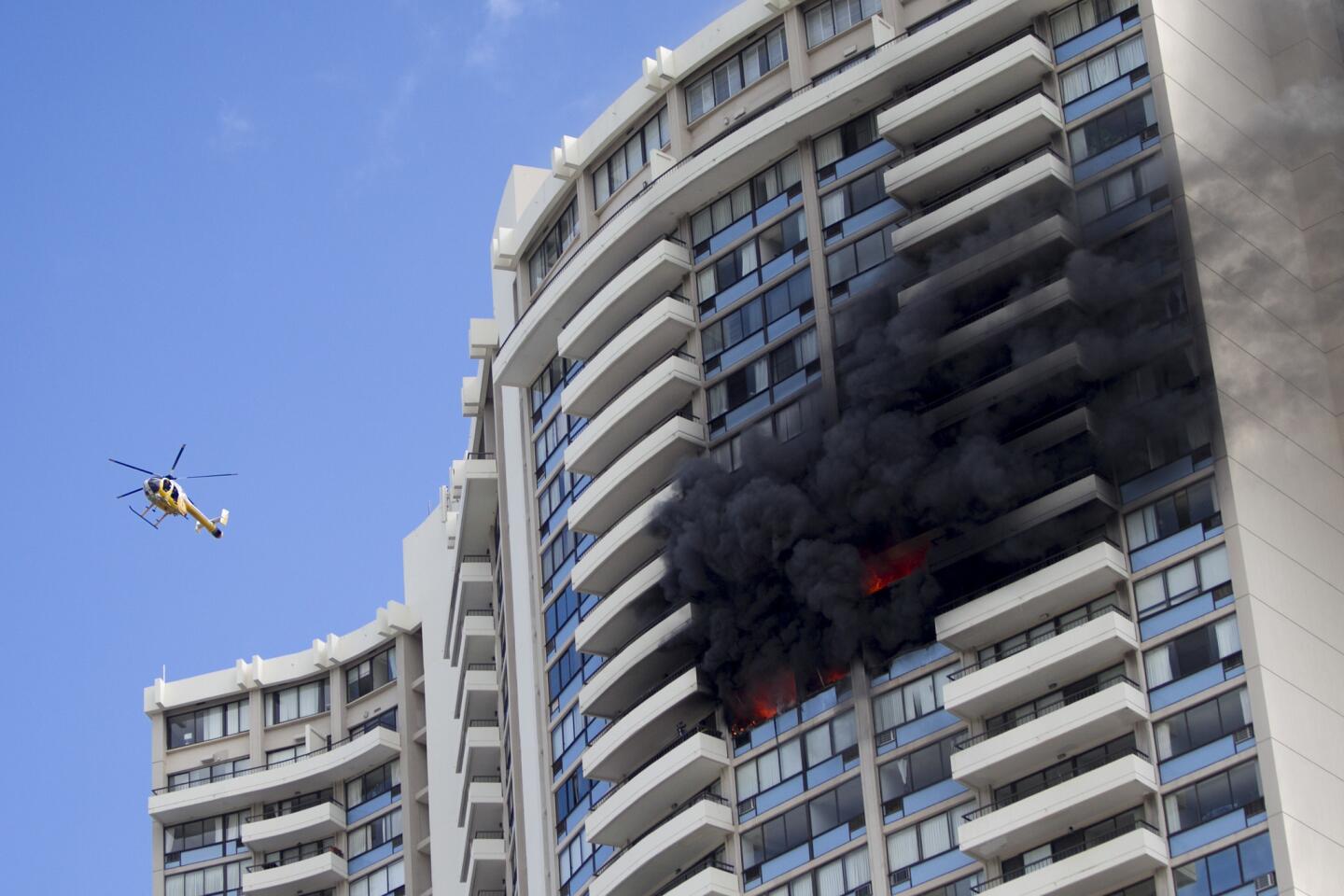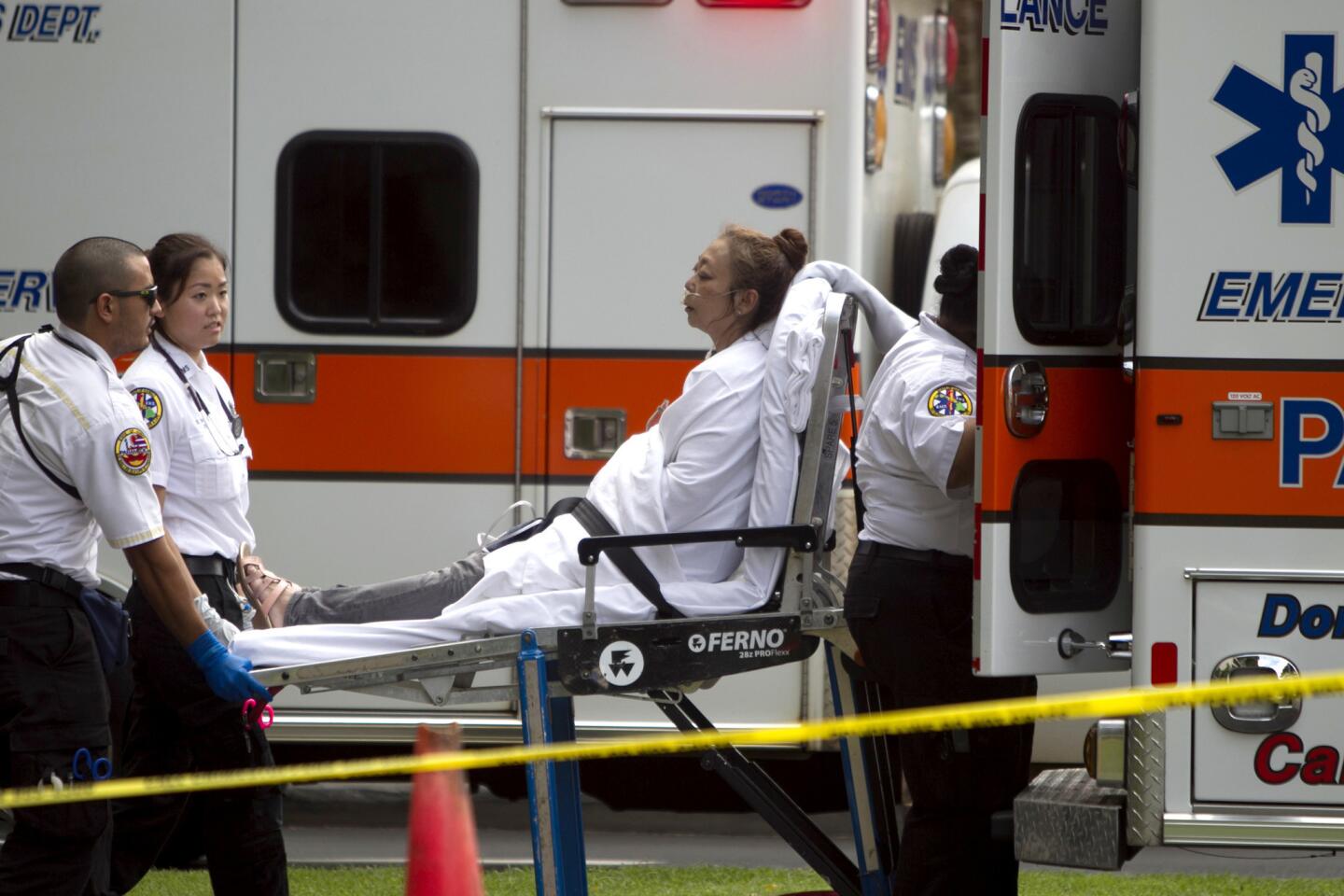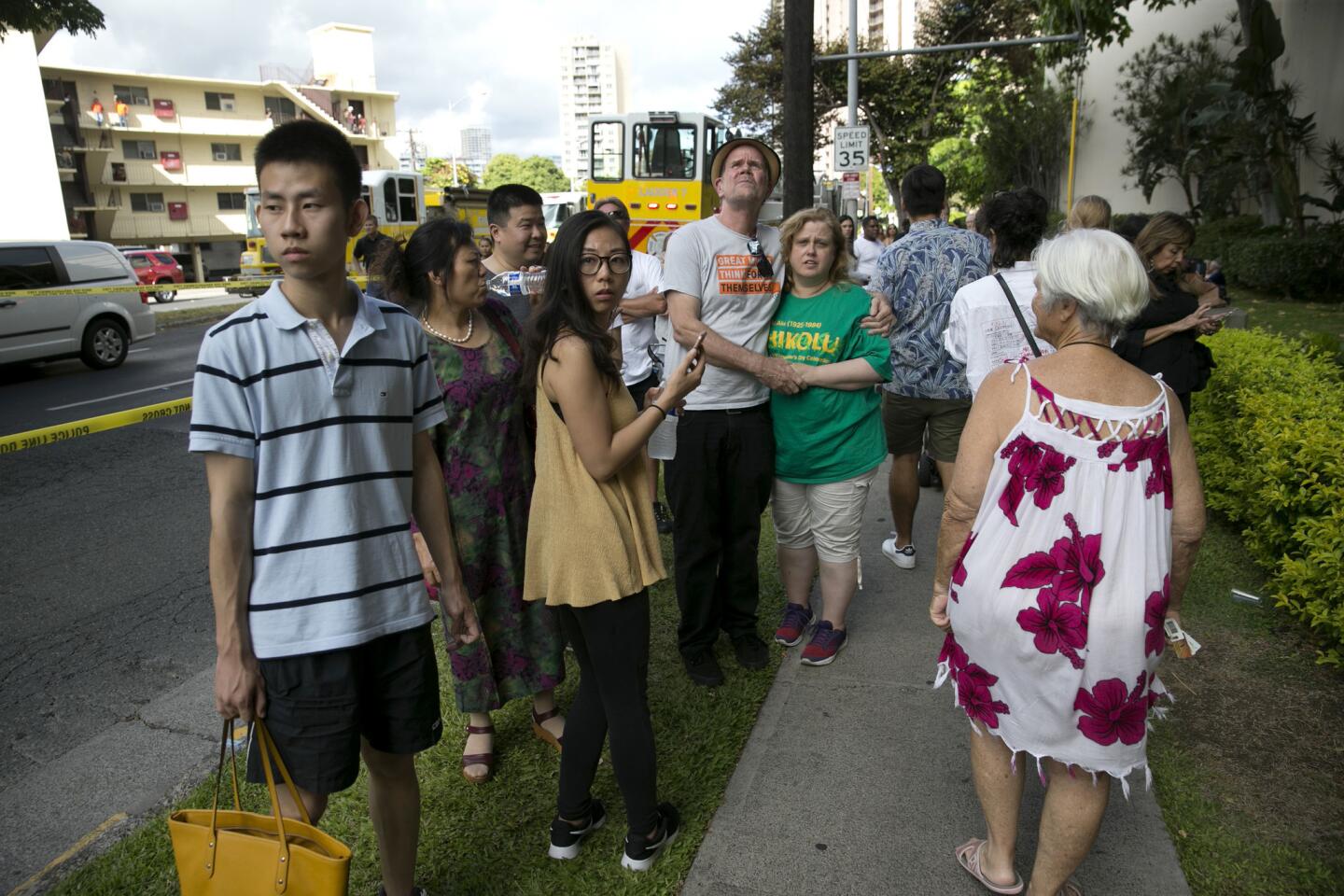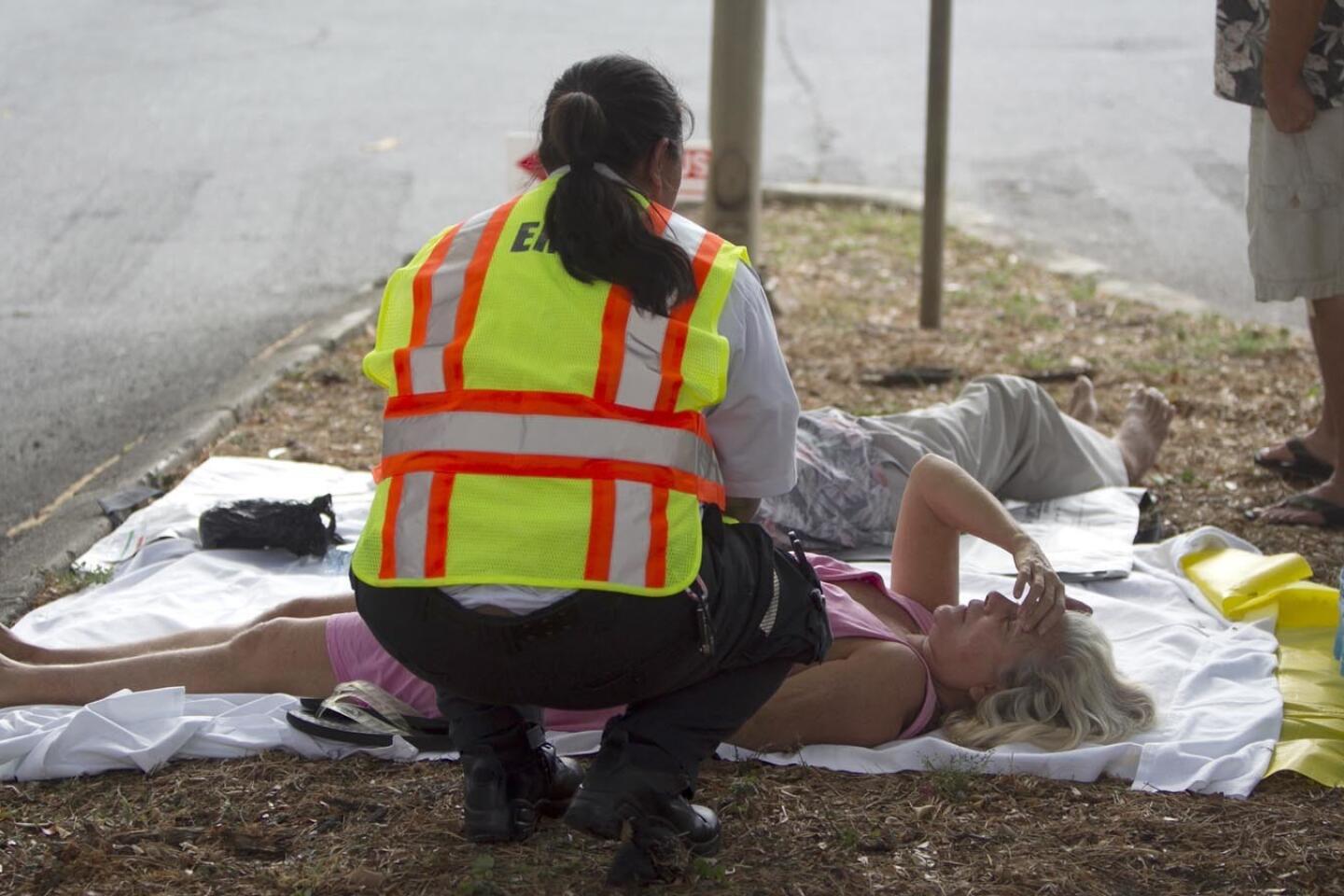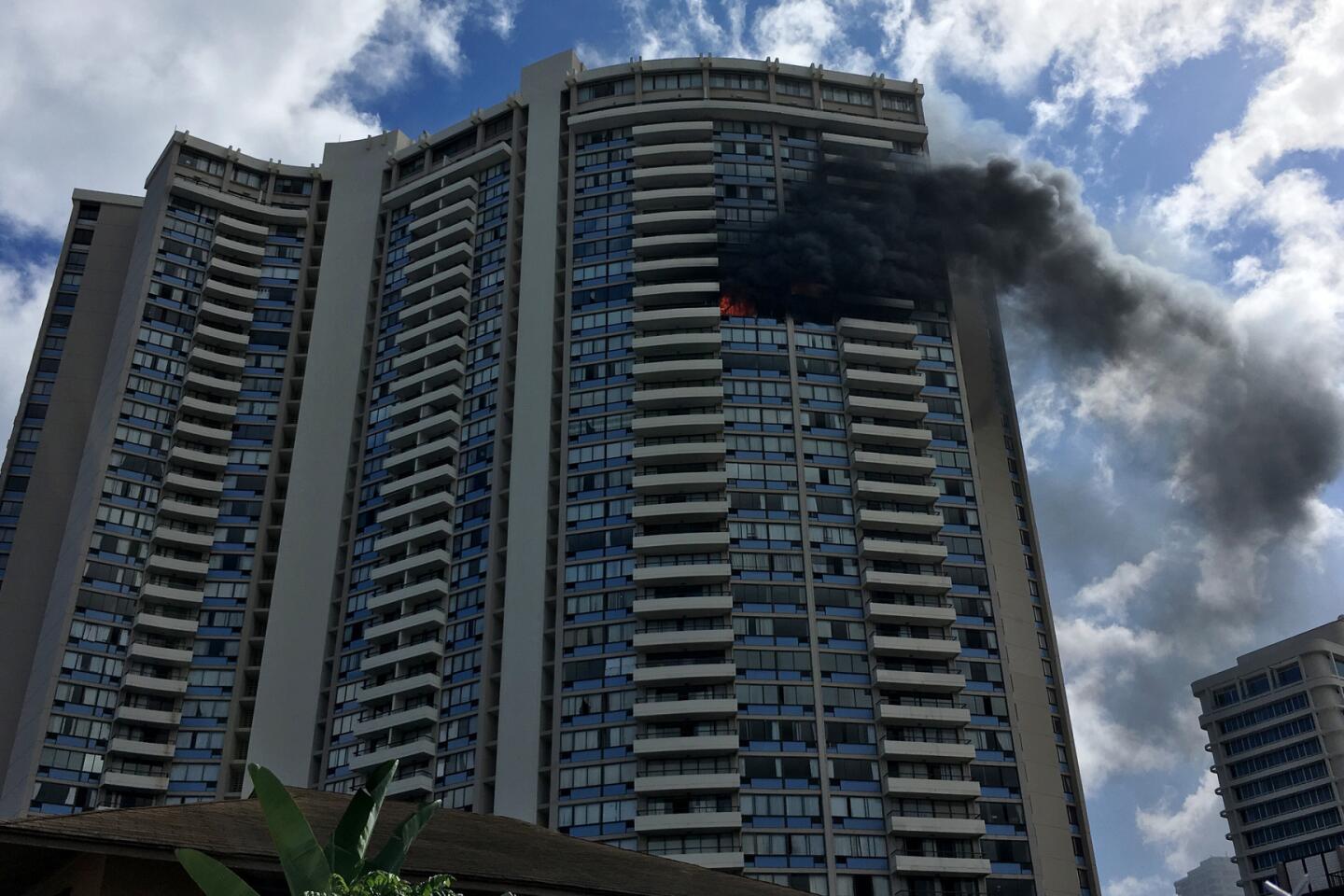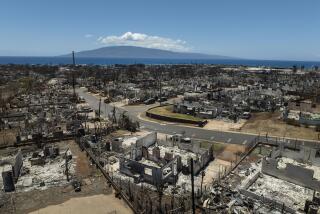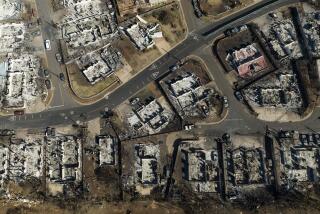Deadly Hawaii fire raises concerns about lack of sprinklers in older high-rises across the U.S.
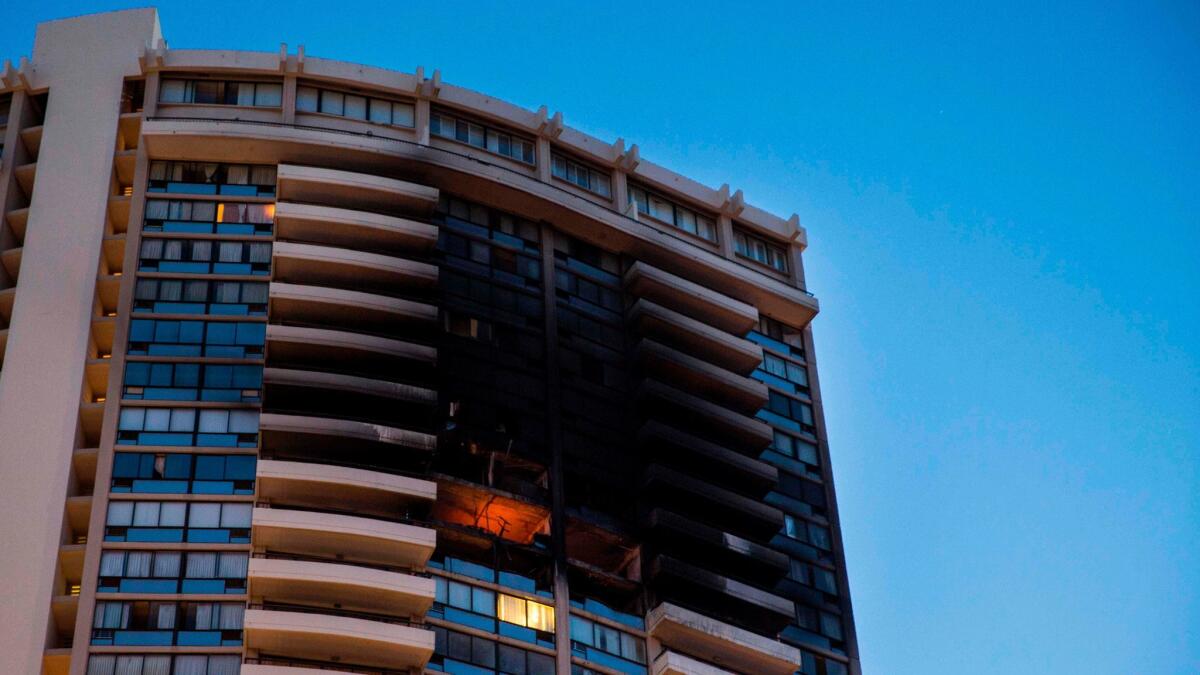
Reporting from Honolulu — Moon Yun Pellerin was still in shock as she sat on a bench Saturday morning in the crowded lobby of her Honolulu high-rise. Her home on the 27th floor — owned by her 78-year-old mother who has dementia — had been destroyed when the raging fire broke out.
“We’re homeless now,” said the dazed 49-year-old, who lived in a condo with sweeping views of the city and Koolau mountains with her mother, husband and cat, Sugar.
“We weren’t aware there were no sprinklers,” she said with a sigh.
At least three people died Friday after the fire swept across the upper floors of the Marco Polo condominium building, shooting flames and plumes of thick, black smoke out windows and causing hundreds of residents to evacuate.
The 36-story tower was not equipped with sprinklers.
Residents and officials in Honolulu, like many other cities across the nation, have for years debated the costs and benefits of installing fire sprinkler systems throughout aging residential condominiums. In Honolulu, persuading owners to retrofit the buildings has been a challenge.
The Marco Polo was built four years before Honolulu required fire sprinkler systems in new residential high-rises. Many of its residents are retirees on fixed incomes.
In 2005, the Honolulu City Council created a task force to estimate the cost of retrofitting and installing fire sprinkler systems in about 300 residential condominium buildings. A report estimated that retrofitting the Marco Polo would cost $4,305.55 for each unit.
A separate report for the Marco Polo Condominium Assn. in 2013 estimated it would cost $4.5 million to retrofit the entire building — about $7,867 for each unit.
Owners, who were represented by the Hawai’i Council of Assns. of Apartment Owners, lobbied strongly against any retrofitting, said Samuel Dannaway, chief fire protection engineer for Coffman Engineers in Honolulu, who authored the 2005 report.
“Cost was the reason,” he said in a telephone interview Saturday. “This was inevitable. We already knew on this one — you need to install sprinklers in a high-rise building for the safety of the occupants and the safety of the firefighters.”
The challenges of installing such systems are particularly complex in massive residential complexes, Dannaway said.
“With condos, you have 600 owners, not one owner,” he said. “You’re likely going to have multiple people who refuse to have the work done, period. It’s a problem.”
The fire broke out on the 26th floor of the complex about 2 p.m. Friday and spread to the 28th floor, Honolulu Fire Department spokesman Capt. David Jenkins said in a statement.
A dozen people were treated by paramedics and evacuated. Four people, including one firefighter, were transported to a hospital with serious injuries.
More than 100 firefighters descended on the scene as the fire broke windows and trapped some residents in their apartments. Many occupants were told to shelter in place until emergency personnel could escort them down stairwells to safety, Jenkins said.
The 572-unit complex, just outside the beachfront neighborhood of Waikiki on the southern shore of the island of Oahu, was built in 1971. Its condominiums sell from around $339,000 to $650,000.
Pellerin, an aspiring screenwriter who was out at lunch when the fire broke out, said her mother was inside the condo. By the time Pellerin rushed to check on her, she was standing outside the building barefoot. Somehow, the 78-year-old woman had walked down the stairwell from the 27th floor.
There was no sign of Sugar.
A stream of residents returned to their homes Saturday morning, many climbing stairs as two of the building’s elevators were out of use. Three floors remain closed because of heavy smoke, water and fire damage.
Jeff Kim, the 31-year-old chairman of an energy subcommittee for the Sierra Club of Hawaii, who has rented a two-bedroom apartment for six months, said he never considered if the building had a sprinkler system.
“I did not actually realize we didn’t have them,” said Kim, whose apartment is a few floors above the units where the fire burned for hours. “I certainly think we should have installed them.”
As he trudged slowly up the stairs to his condo, past the blackened, charred apartments at the center of the blaze, Kim said: “It’s got to be done.”
Dean Hirabayashi, senior vice president of finance at American Savings Bank, who owned a 33rd-floor condo since 2002, was relieved to find it relatively unscathed. He said he was aware that the condo, where his parents live, did not have sprinklers but had never attended condo association meetings.
“It worries us,” he said. “I think I would pay it. But for a lot of owners it’s not an easy decision. A lot of retirees are living on fixed incomes.”
Friday’s fire was not the first fire to break out in the 46-year-old building. In 2013, a fire started in a microwave oven in an eighth-floor apartment, spreading quickly to the unit above, according to the Honolulu Star-Advertiser.
Residents of both units escaped that fire with no injuries. Seven floors of the building were evacuated, and officials estimated the damage at about $1.1 million.
National building codes have required automatic fire sprinklers in large public and commercial buildings since the early 1980s. Those codes, however, do not apply to older residential high-rises unless a state or local municipality enacts regulations.
Only a handful of states, including Florida and New York, require building owners to retrofit existing high-rise buildings with sprinklers. Multiple cities, including Los Angeles, Denver and Philadelphia, have also introduced requirements, said Brian Jay Meacham, associate professor of fire protection engineering at Worcester Polytechnic Institute in Massachusetts.
“The majority of the country is not doing the retrofits,” said Glenn Corbett, associate professor of fire science at John Jay College of Criminal Justice in New York. “You see this patchwork of places that have it and others that do not.”
Although installing sprinklers in high-rises is highly effective — “the chances of dying in a fully sprinkled high-rise are just about zero,” Corbett said — the problem is cost.
It typically costs more than $10 per square foot to install sprinkler piping throughout older residential high-rises, Corbett said. Retrofitting sprinklers is more challenging in residential towers than office buildings because they are typically split into multiple compartments.
“Wall after wall, you have to penetrate with piping, and that means moving people around in apartments,” Corbett said. “They can’t live there while workers are drilling holes in their walls.”
Honolulu Mayor Kirk Caldwell said Friday that his city needs to look at passing a new law requiring sprinklers in older high-rises.
“The biggest argument is the affordability,” Caldwell told the Associated Press. “Residents have to pay. It’s pretty expensive. But if it saves a life and it’s your life, it’s worth the cost.”
Asked if he was concerned enough over the lack of sprinklers to move out of his apartment, Kim wasn’t sure.
“I’m guessing this isn’t likely to happen any time in the next couple of years,” he said. “But it’s definitely a question that’s making me think right now. It does make me consider moving out.”
Special correspondent Chang reported from Honolulu, and special correspondent Jarvie reported from Atlanta.
ALSO
Body camera video shows police trying to explain why they pulled over Florida state attorney
UPDATES:
7 p.m.: This article was updated with comments from Moon Yun Pellerin.
4:50 p.m.: This article was updated with additional comments from tenants and fire prevention experts regarding sprinklers.
2:30 p.m.: This article was updated with comments from a tenant, the mayor of Honolulu and fire prevention experts.
This article was originally published at 11 a.m.
More to Read
Sign up for Essential California
The most important California stories and recommendations in your inbox every morning.
You may occasionally receive promotional content from the Los Angeles Times.
